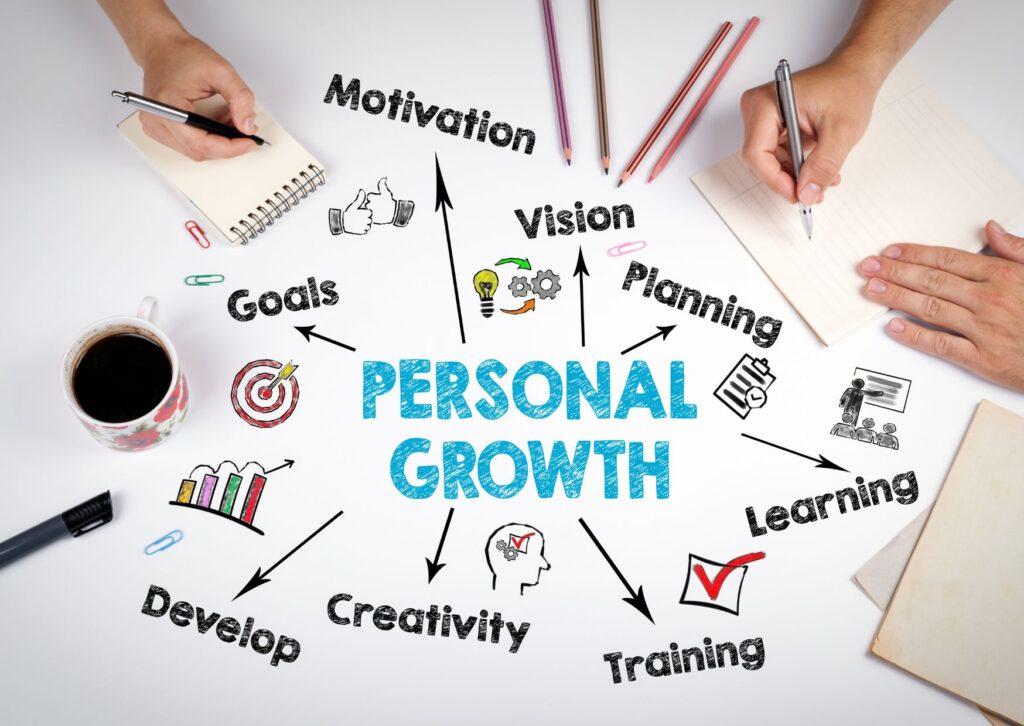Personal growth is a lifelong journey that involves the continuous pursuit of self-improvement and the realization of one's full potential. It encompasses a wide range of areas, including emotional, intellectual, and physical development, and it plays a critical role in achieving a fulfilling and successful life. In this article, we will explore the various dimensions of personal growth, the importance of setting goals, the role of mindset, and practical strategies to foster personal development.
Dimensions of Personal Growth
Personal growth can be categorized into several dimensions:
-
Emotional Growth: This involves understanding and managing one's emotions effectively. Emotional intelligence, which includes self-awareness, self-regulation, motivation, empathy, and social skills, is a key component of emotional growth. Developing emotional intelligence allows individuals to handle stress, build strong relationships, and make informed decisions.
-
Intellectual Growth: This pertains to the expansion of knowledge, skills, and cognitive abilities. Intellectual growth is achieved through continuous learning, critical thinking, and problem-solving. It encourages curiosity and creativity, enabling individuals to adapt to new situations and challenges.
-
Physical Growth: Physical well-being is an integral part of personal growth. It includes maintaining a healthy lifestyle through regular exercise, proper nutrition, and adequate rest. Physical health supports overall well-being and provides the energy needed to pursue personal and professional goals.
-
Social Growth: This dimension involves building and maintaining meaningful relationships. Social growth requires effective communication, empathy, and the ability to collaborate with others. It also involves developing a support network that can provide guidance, encouragement, and accountability.
-
Spiritual Growth: Spiritual growth is about finding purpose and meaning in life. It can involve exploring one's values, beliefs, and connection to something greater than oneself. This dimension can provide a sense of inner peace and direction.
The Importance of Setting Goals
Setting goals is a fundamental aspect of personal growth. Goals provide direction, motivation, and a sense of accomplishment. They help individuals focus their efforts and measure progress. When setting goals, it is important to make them SMART: Specific, Measurable, Achievable, Relevant, and Time-bound. This approach ensures that goals are clear and attainable, increasing the likelihood of success.
-
Specific: Goals should be clear and precise. Instead of setting a vague goal like "improve health," a specific goal would be "exercise for 30 minutes five times a week."
-
Measurable: Goals should have criteria for measuring progress. For example, if the goal is to read more, a measurable goal could be "read one book per month."
-
Achievable: Goals should be realistic and attainable. Setting overly ambitious goals can lead to frustration and discouragement. It's important to consider one's current circumstances and resources.
-
Relevant: Goals should align with one's values and long-term objectives. They should be meaningful and contribute to personal growth.
-
Time-bound: Goals should have a deadline or timeframe. This creates a sense of urgency and helps prioritize tasks.
The Role of Mindset in Personal Growth
A growth mindset is crucial for personal development. Coined by psychologist Carol Dweck, a growth mindset is the belief that abilities and intelligence can be developed through effort, learning, and persistence. In contrast, a fixed mindset is the belief that abilities are static and unchangeable. Adopting a growth mindset can lead to greater resilience, a willingness to embrace challenges, and a positive attitude towards learning and improvement.
-
Embrace Challenges: Viewing challenges as opportunities for growth rather than obstacles can lead to personal development. Challenges push individuals out of their comfort zones and encourage learning and adaptation.
-
Learn from Criticism: Constructive feedback is essential for improvement. Instead of taking criticism personally, those with a growth mindset use it as valuable information to enhance their skills and knowledge.
-
Celebrate Effort: Recognizing and celebrating effort rather than just outcomes fosters a growth mindset. It emphasizes the importance of persistence and hard work.
-
View Failures as Learning Opportunities: Failure is an inevitable part of the growth process. Instead of seeing failure as a setback, individuals with a growth mindset see it as a learning experience and an opportunity to try again with more knowledge and insight.
Practical Strategies for Personal Growth
-
Continuous Learning: Engage in lifelong learning through formal education, online courses, workshops, reading, and self-study. Keeping the mind active and curious is key to intellectual growth.
-
Mindfulness and Reflection: Practicing mindfulness and regular self-reflection can enhance self-awareness and emotional intelligence. Techniques such as meditation, journaling, and deep breathing exercises can help manage stress and improve focus.
-
Healthy Lifestyle: Prioritize physical health through regular exercise, balanced nutrition, and sufficient sleep. Physical well-being supports mental and emotional health.
-
Positive Relationships: Surround yourself with supportive and positive people. Building a strong network of friends, family, and mentors can provide encouragement and accountability.
-
Set and Review Goals: Regularly set, review, and adjust personal and professional goals. This helps maintain focus and motivation while allowing for flexibility and adaptation as circumstances change.
-
Seek Feedback and Mentorship: Actively seek feedback from others and consider finding a mentor who can provide guidance, support, and perspective.
-
Embrace New Experiences: Step out of your comfort zone and try new activities or challenges. This can lead to personal growth and a broader perspective on life.
-
Time Management: Develop effective time management skills to prioritize tasks and activities. Efficient use of time allows for a balanced approach to work, leisure, and personal development.
Conclusion
Personal growth is a continuous and dynamic process that requires intentional effort and a positive mindset. By focusing on the various dimensions of growth, setting SMART goals, adopting a growth mindset, and implementing practical strategies, individuals can achieve their full potential and lead fulfilling lives. The journey of personal growth is unique for everyone, but the principles of self-improvement and lifelong learning remain universal. Embrace the journey, celebrate progress, and strive to become the best version of yourself.



